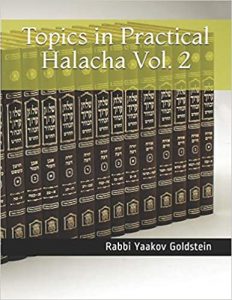*As an Amazon Associate I earn from qualifying purchases.
Entering another person’s property without permission:
It is forbidden to enter a person’s property without their permission.[1] This applies whether the property is owned by a Jew or a gentile.[2] This applies even if the person is not currently living in that property.[3] This applies even if one is entering only momentarily, and will not cause any monetary loss to the property, such as to use it as a shortcut to pass to the other side, or to protect himself from the sun or the rain, and the like.[4] [It goes without saying that one may not make use of facilities within another’s property without their permission, such as to use their swimming pool and the like. This applies whether to private property, such as a home, or to property of a business, which is owned by the business owners.[5] Accordingly, it is forbidden for non-guests to make use of hotel facilities, under the guise of a guest, such as to use the gym, swimming pool, partake in meals, and make use of any other amenity that is restricted only to guests. Likewise, it is forbidden to make use of a Mikveh without paying the due fee. It is forbidden to enter a bus or subway without paying the fare, and so on and so forth of all cases of the like.]
Stolen property:[6] All property which according to Halacha is considered to have been stolen from its rightful owner, is forbidden for one to enter or make use of, even if he receives permission from the current residents, until one receives permission from the Halachic owner. This applies even if one is entering only momentarily, and will not cause any monetary loss to the property, such as to use it as a shortcut to pass to the other side, or to protect himself from the sun or the rain, and the like. [Thus, all property which according to Jewish law belongs to one person, and another person took away the property through the secular justice system and its laws, the property is considered stolen and one may not make any use of it, even with permission of the current owners. This can occur in in cases of inheritance, where the sons are entitled to inherit the property of their father, and a daughter usurps a property from them, under the inheritance laws relevant in that country, which do not follow Halacha. If according to Halacha the property belongs to the sons, and they never agreed to relinquish the property to the sister, then it is considered stolen, and one may not make use of it, even if he receives permission from the daughter. Accordingly, if a hotel was “inherited” by a daughter in such a fashion, it is forbidden to stay by such a hotel even for payment.]
__________________________________________________________
[1] There are several sources which back this prohibition: 1) So rule regarding a stolen home and seemingly the same would apply to using someone’s property without their permission: Admur Hilchos Gezeila 11 “It is forbidden to enter the home for shade from the sun, or protection from the rain, or to pass through the field”; Michaber C.M. 369:2; Rambam Gezeila 5:3; 2) So rule regarding the rule of Zeh Nehneh Vizeh Lo Chaser that we never force another to let someone else in their property: Rama 363:6 3) So rule regarding stealing with intent to return: Admur Gzeila Ugineiva 3; Michaber C.M. 348/1; Rambam Hilchos Gneiva 1/2; Learned from Braisa Bava Metzia 61b “Liminkat” regarding stealing in order to pay Keifel [See Kuntrus Achron ibid 1] 4) By a private home or area, this is also forbidden due to Hezek Reiya: Admur Nizkei Mamon 11-13; Rama 154/3; Michaber 357/1 “Hezek Reiyah”; Tur 157; Rosh Baba Basra 1; Baba Basra 2b;
The reason: Entering another’s property without permission is prohibited due to stealing and if it is a private area, such as a private home, it is also forbidden due to Hezek Reiya. Vetzaruch Iyun in a case that Hezek Reiyah is not relevant if the prohibition is a Biblical transgression against stealing or not.
Other opinions: Some Poskim rule it is only forbidden to steal with intent to keep the item, however to steal temporarily is permitted, and so is done on a daily occurrence. [second Pirush, and conclusion, in Shita Mekubetzes on Gemara ibid, brought in Pischeiy Teshuvah 348/2 and Ketzos Hachoshen 348/1; See Smeh ibid who seems to learn in Michaber that stealing for pain is to keep the item; Pischeiy Teshuvah 348/2 and Ketzos Hachoshen 348/1 conclude it is proper to be stringent] Seemingly, according to this opinion, the same would apply to entering someone’s property without intent to steal. However, in truth, there are other prohibitions involved here, such as Hezek Reiyah, and using facilities that are meant for payment, which certainly would apply even if one only enters temporarily.
[2] Admur Hilchos Gezeila 1 and 4; So rule regarding the rule of Zeh Nehneh Vizeh Lo Chaser that we never force another to let someone else in their property: Rama 363:6
[3] Pashut, due to the stealing prohibition. See Admur Hilchos Gezeila 11
[4] Admur Hilchos Gezeila 11 regarding a stolen home “It is forbidden to enter the home for shade from the sun, or protection from the rain, or to pass through the field”;
[5] Making use of facilities which are intended to be used by paying customers is considered stealing: See Michaber C.M. 363:6 regarding one who stays in a hotel without paying
[6] Admur Hilchos Gezeila 11; Michaber C.M. 369:2; Rambam Gezeila 5:3


 Donate
Donate

Leave A Comment?
You must be logged in to post a comment.